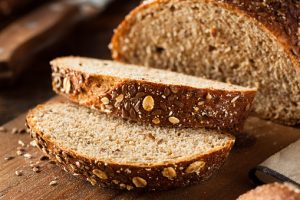
The cold season may be over, but the aftermath of winter still lingers. If you want to escape that feeling of being drained of energy all the time, perhaps it’s time for a seasonal menu change.
5 food swaps to boost your energy
Whole grains for refined carbs: Refined carbs are dietary villains. They raise our blood glucose, and in response, our body releases insulin to bring the levels down, making us feel groggy and lethargic. Not to mention that the extra insulin makes your body turn carbs into fat for storage (in the form of unwanted pounds). Switching from these bad boys—amply present in white bread and pasta—and instead eating whole grains will help you feel fuller for longer periods of time, prevent those sweet cravings, and provide you with slow-releasing energy that will keep you going all day long. Rye bread and quinoa are great substitutes to start with. (You don’t have to suffer in silence with digestion problems.)
Fruit for juice: Even if you avoid sugar-loaded store-bought fruit juices, the problem lies in the beverage form itself—it is way too easy to drink excess calories. For instance, in a glass of apple juice, you get the equivalent of five to six apples worth of calories and sugar. While you would drink a glass of juice in one sitting, you definitely would not eat six apples at the same time. While fruit juice is an easy on-the-go option that’s occasionally good, regularly eating fresh fruits will benefit you more in the long run, providing an extra dose of nutrients that usually get lost during pasteurization.
Coconut oil for butter: Most conventional dairy products on store shelves contain traces of synthetic drugs and antibiotics given to cows on the farms, which may disturb your hormone balance and gut microbiota. As a healthier substitute, try coconut oil. Devoid of chemicals, it is safe for cooking at high temperatures and helps reduce cardiovascular risk by lowering your cholesterol. (Miracle fruit lowers cholesterol in 30 days.)
Grated apple for sugar: Sugar contributes to weight gain and even insulin resistance, so instead of sweetening your breakfast oatmeal, add some grated apple. You will get a good dose of antioxidants and fiber that will keep you full and prevent the sugar crash. Other perks you get from eating apples include protection from oxidative stress and a good gut bacteria boost. If you’re not a big fan of apples or are looking to diversify your options, try strawberries.
Coconut yogurt for dairy yogurt: Dairy products often lead to digestive discomfort and other health issues, especially in people who are lactose sensitive. If you still like to have yogurt for breakfast or as a midday snack, switch to coconut yogurt. Low in calories and fat, it is a good source of fiber and calcium.
These healthy food substitutes can be easily found in stores and will introduce an interesting twist to your daily menu. Whether you are adventurous, health conscious, or both, these food swaps will make you rethink your eating habits and give you a boost of long-lasting energy to keep you going. Following these swaps will help you make sugar crashes and post-meal lethargy a thing of the past.
Related: Urine test can detect a person’s healthy diet: Study